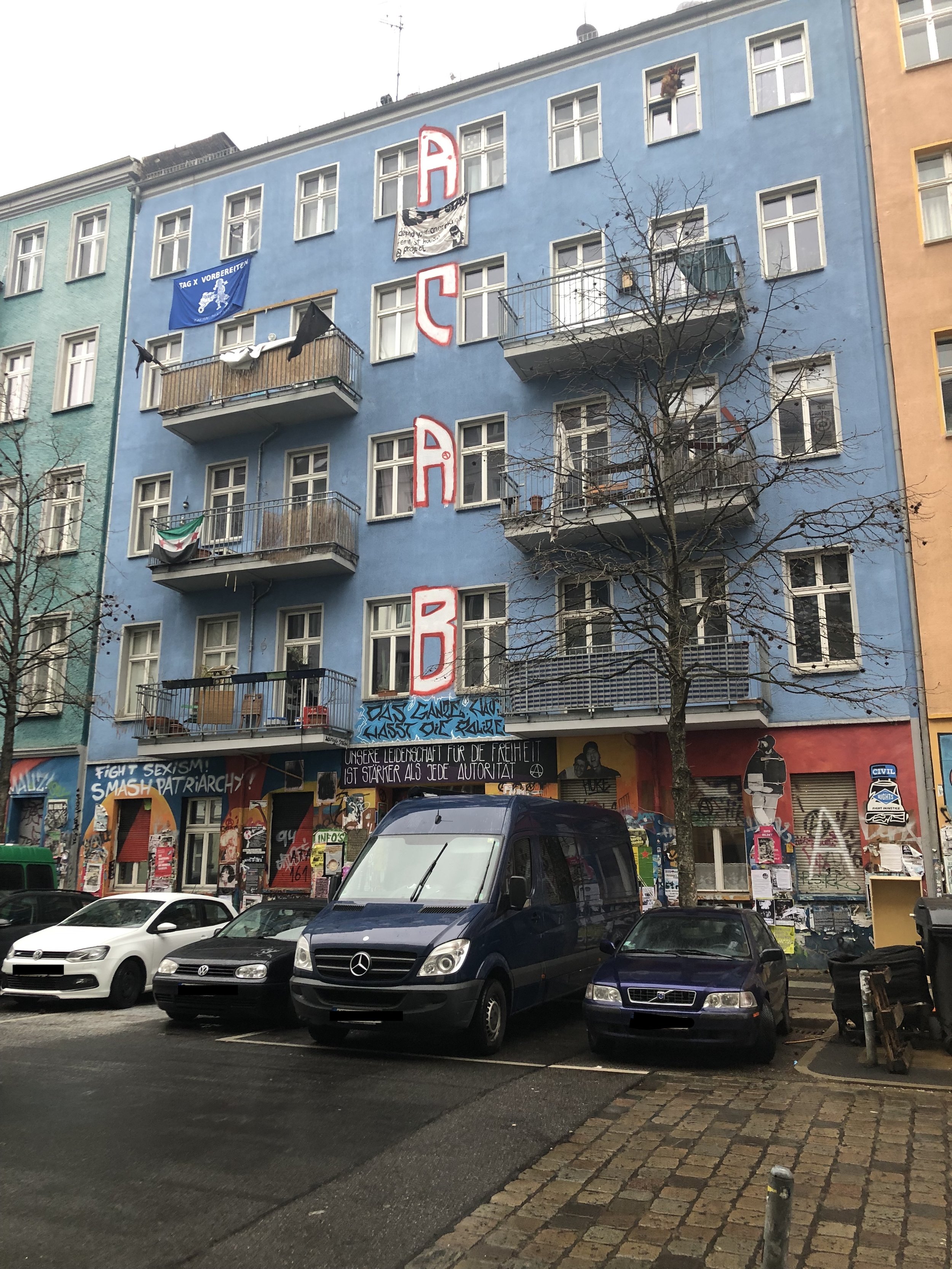It was a cold, mostly clear night as hundreds of police officers, including an elite tactical unit (SEK) accompanied by at least one helicopter, raided a brightly painted house on Rigaer Straße. It was January 13, 2018 and the police didn’t have a search warrant, instead relying upon the General Law for the Maintenance of Security and Prevention of Violence (Allgemeine Sicherheits- und Ordnungsgesetz zur Gefahrenabwehr).
But really, if we’re being honest, the reason 550 police and special commandos were there was likely quite simple: revenge.
Scene of the police raid from January 2018, a house on Rigaer Straße. The sign above the door says “Our passion for peace is stronger than every authority.”
A few days earlier, a police officer attempting to issue a citation on Rigaer Straße had been attacked by masked assailants. Although the identities of the assailants was unknown, both the location and mode of attack was well known to the police. Although there hasn’t been an official acknowledgement, it seems clear that the police believed the assailants were affiliated with the group of squatters, Antifas, and other left-wing activists in the area.
You see, Rigaer Straße 94 has been squatted since 1990. Back then, it was one of dozens of similar squats throughout Berlin, and one of many in and around Rigaer Straße itself. Over the years, most of Berlin’s squats have been either legalized through rental contracts, or the residents have been forcibly removed.
Another squatted building located on Samariter Straße, around the corner. There’s a cafe inside as well as a space for events.
Rigaer Straße is one of the last strongholds of a movement that can seem chaotic and violent - and, if we’re being honest - often is chaotic and violent. But in a city with rising rental prices and an acute need for housing, occupied buildings don’t exactly enjoy widespread support in the way that they once did. People want housing, and the fact is that these squatted buildings, whose residents pay little if anything, are preventing other people from living in those spaces.
Another squatted house on Rigaer Straße. There’s a bar downstairs, and a website explaining the project.
The issues and simmering conflict that exploded into the open on the night of January 13, 2018 go well beyond a half-dozen or so occupied houses, of course. For the police and conservative-leaning politicians, it’s about maintaining “law and order,” about the ability of the state to exert control. Indeed, Rigaer Straße is officially classified as a “Danger Area” (Gefahrengebiet), giving the police enhanced powers.
Another occupied house at the corner of Rigaer and Liebigstraße in Berlin. These brightly colored buildings are a few of the last remaining strongholds of the squatter movement in Beriln.
For the squatters themselves, who have meanwhile come to represent any number of left-wing activities, the idea is pretty basic. They reject capitalism, viewing it as dangerous and inherently unfair. They see rising rents and gentrification as threats not only to the fabric of the neighborhood, but to the very idea of democracy and equal representation.
For the squatters, the police raid is probably viewed as yet another in a series of violent attacks by establishment authorities that view them as a threat to be eliminated. When money threatens to become more powerful than people, then the people have a right to fight back.
Intersection of Rigaer Straße and Silvio Meier Straße. Silvio Meier was a leftist activist who was murdered by Neo-Nazis in 1992.
The feeling of being existentially threatened runs deep in the activist scene in Friedrichshain. Silvio-Meier-Straße intersects Rigaer Straße not far from house number 94. Silvio Meier was a young leftist activist who had been squatting in one of the buildings in the neighborhood. On November 21, 1992 he was murdered in the Samariterstraße U-bahn station by Neo-Nazis.
I have very conflicted feelings about all of this. I see the right in both sides of argument, and also the wrong. I believe that the police have the right to carry out lawful missions, and that anyone attacking a police officer issuing a citation should be prosecuted.
I also believe that all citizens of Berlin are entitled to fair and equal treatment before the law. Although a judge recently rejected a civil complaint against the police raid, I believe that the reputation of the police in the matter of squatters’ houses has been irreparably damaged by the raid, the results of which, by the way, were essentially zilch/zero/nothing.
Most reasonable people can see that the raid was an act of revenge; at the very least, most reasonable can agree that it can appear that way. And in politics, appearance is everything.
I have sympathy for activists who engage on behalf of poorer residents in the name of maintaining the social fabric of neighborhoods. I’m also not a capitalist ideologue, and agree that in many cases, money can be valued too highly these days. From a more macro level, I also believe that in a liberal democracy, people should be free to live however they want, as long as their rights do not infringe on others’ rights.
I have no sympathy for activists who use violence to achieve political means. I believe that Germany’s form of representative democracy, while not perfect, is democratically legitimate and must have, as they say, a monopoly on the use of violence for political means. Attacking a police officer issuing a citation is unacceptable. The proper venue in which to protest that action is in a courtroom, not on the street.
This issue isn’t going to be solved via blog post. It will be solved only through a combination of peaceful demonstrations, legal action, and civil debate. Violence from either side is not acceptable, and will only serve to inflame the issues at hand, rather than solve them.

